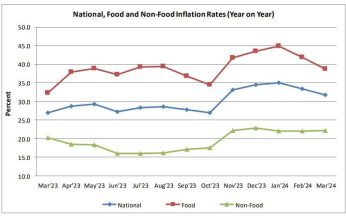Malawi out to meet Sadc, Comesa tariffs target
 Malawi has intensified the downward adjustment of tariffs in pursuit of meeting the Sadc and Comesa thresholds, Finance Minister Dr. Ken Lipenga has said.
Malawi has intensified the downward adjustment of tariffs in pursuit of meeting the Sadc and Comesa thresholds, Finance Minister Dr. Ken Lipenga has said.
Lipenga said this in an interview on Wednesday when Nation Online sought his comment on progress over Malawi’s commitment towards harmonisng its tariff structure into Common Market for Eastern and Southern Africa (Comesa) and Southern Africa Development Community (Sadc), among other regional initiatives.
“Under the Comesa and Sadc tariff phase-down, Malawi has adjusted its tariff rates to meet the Sadc and Comesa thresholds as member states prepare to implement deeper levels of integration,” said Lipenga.
He said just like any other member state, under the treaties establishing regional integration organisations, Malawi has an obligation to adhere to commitments which have been agreed and endorsed.
Malawi’s alignment of its trade tariffs to the regional community also comes at a time when the Comesa-EAC-Sadc has deepened its tripartite agreement with the aim of strengthening and deepening economic integration of the Southern and Eastern Africa region.
The trade arrangement proposes, among others, zero trade tariffs and no quotas amongst the member countries.
At regional level, Malawi is a member of both Sadc and Comesa.
Basically, regional integration entails the coming together of two or more states, normally through reciprocal preferential agreements.
Lipenga argued that there is need for Malawi to align herself with the Sadc and Comesa harmonised tariff structure and other regional initiatives.
He said the phasing down of tariffs is a progressive continuation of the alignment programme which started in the year 2000.
“Malawi is committed to regional integration as reflected to our own policies. We believe regional integration and trade in general terms is beneficial to Malawi,” said Lipenga.
Trade analysts, however, caution that regional integration can be complicated by perceived or real gains or losses among the members that may lead to disputes and a sense of loss of national sovereignty.
They argue that for integration to be successful, it requires strong commitment by all parties in implementing the agreed arrangements, fair mechanisms to arbitrate disputes and equitable distribution of the gains and costs of integration.
Under Sadc, Malawi is committed to reducing tariff on intra-Sadc trade progressively.
This follows the Sadc protocol implementation which was aimed at creating Sadc Free Trade Area (FTA) which was achieved in 2008 and it envisages the establishment of a Customs Union by 2012.





